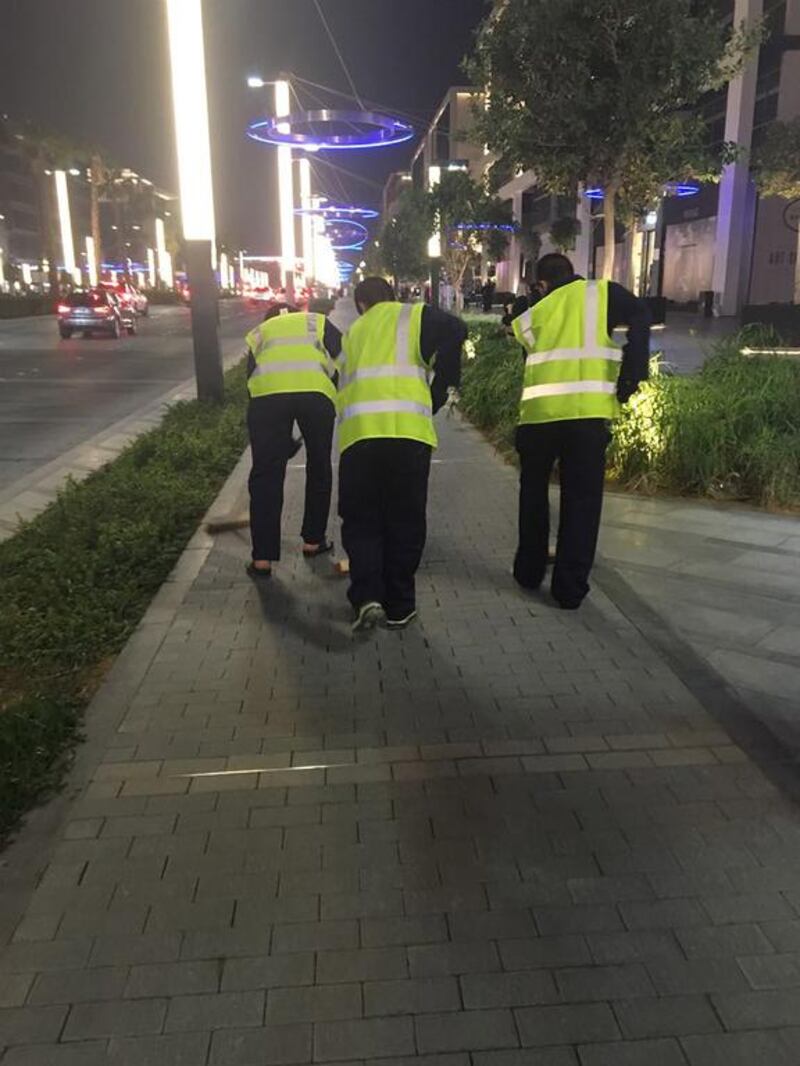ABU DHABI // Making dangerous and reckless drivers do community service would deter them from flouting the law and make the country’s roads safer, motorists and experts say.
“Doing community service for some offenders helps them look at things from a different perspective and enhances their awareness and appreciation,” said Dr Salaheddine Bendak, associate professor at the University of Sharjah.
“Research has shown that this is a deterrent penalty for some offenders.”
Sheikh Mohammed bin Rashid, Vice President and Ruler of Dubai, recently ordered a group of men arrested for reckless driving to perform community service for a month.
They will have to clean the city’s streets for four hours a day for 30 days, Dubai Media Office said on Thursday.
“The move sends a very important message to the public and to motor vehicle drivers,” Dr Bendak said. “When leaders and public figures send such traffic safety messages, they serve as role models and enhance awareness among road users of the importance of thinking of others when using our roads.”
Saif bin Adhed, an Emirati motorsport enthusiast, praised the Dubai Ruler’s move to curb reckless driving among the youth.
“It’s the best solution,” he said. “It will deter everyone else on the road from driving recklessly and breaking the law.”
The driver and passengers were arrested after being filmed stunt driving at City Walk. A video showed the Emirati motorist driving in circles at a high speed, just metres away from pedestrians, after heavy rain.
Dubai traffic police said the driver had been arrested and his 4x4 confiscated. They said he could expect to face charges and a Dh100,000 fee to recover the vehicle.
Kamui Mahtani, another motorsport enthusiast who watched the video, said it was a miracle that no one got injured at the busy location.
“I have the utmost respect for the decision of Sheikh Mohammed bin Rashid,” he said. “Performing community service is not only an effective form of punishment but it also teaches a valuable lesson in humility and respect for others.”
His friend Adnan Khalil, who is also into motorsport, believed the driver and his companions deserved the maximum penalty.
“Ordering them to clean Dubai’s streets will teach them to be aware of the consequences of stunt driving and drive sensibly in heavy rain,” he said.
In Al Ain, reckless drivers were made to do community service as part of a trial scheme launched by the police in December 2007.
Drivers were forced to spend a day sweeping streets or cleaning schools as punishment for speeding, drag racing, running red lights or breaking other traffic rules, although the scheme is no longer operational.
In other countries, offenders carry out public services for varying lengths of time for a variety of minor offences.
“I came across many cases in developed countries where judges ordered traffic offenders to work as traffic safety wardens in front of schools so that they would appreciate the importance of traffic safety, especially for children,” said Dr Bendak, who has published papers on tyre safety, seat-belt use and child restraints.
In 2014, the Federal Traffic Council made a recommendation to introduce up to 240 hours of community service as an alternative punishment for serious traffic offences, but it is not yet law.
Some offences suggested for community service were heavy goods vehicles overtaking, exceeding the legal limit of 30 per cent window tinting, driving without a licence, reckless driving and exceeding the speed limit by 60kph.
Last year, the FTC had also suggested detaining people who did not follow the rules of the road or broke the speed limit by more than 60kph.
Proposed changes to the traffic law must be approved by the Ministry of the Interior and the federal Cabinet.
rruiz@thenational.ae






